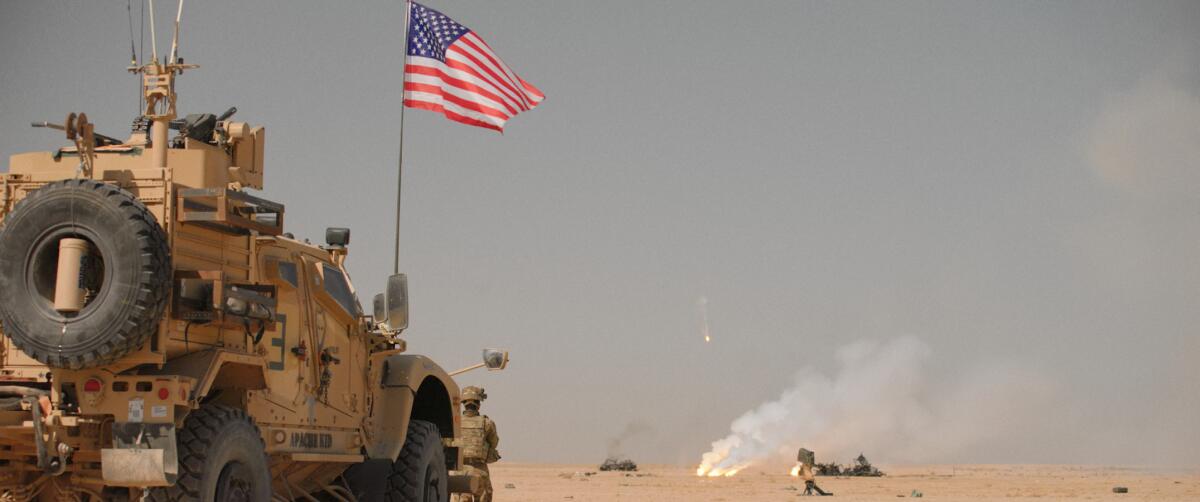Review: Matthew Heineman captures a messy U.S. exit from its longest war in ‘Retrograde’

- Share via
War movies are ultimately relationship movies, whether it’s the trench bond that allows hell to feel temporarily palatable or a soldier’s reckoning with a very clingy abyss. “Retrograde,” Matthew Heineman’s on-the-ground documentary about the U.S. getting out of Afghanistan, is indeed both as it depicts tightly bonded Green Berets and Afghan army stalwarts fighting off a resurgent Taliban. But because it also deals with the enforced end of their partnership, it’s a breakup flick too, and a despondent one at that.
Heineman’s adrenalized, in-the-thick-of-it approach as a documentarian has seen him dive into the middle of the drug war (“Cartel Land”), ISIS taking over Syria (“City of Ghosts”) and a COVID-beset hospital (“The First Wave”). He’s not big on context, but there’s no denying the brute force of his insider-driven vérité, and in some cases — as when he knew to layer unfolding political turmoil into a for-hire pop star biodoc (“The Boy From Medellin”) — his adaptive storytelling instincts are commendable.
Such is what happened with “Retrograde,” which started in 2020 as an embedded portrait of the Green Berets after 20 years in Afghanistan. Things shifted when geopolitical winds spelled an end to America’s longest war, made real when a newly installed President Biden announced a full troop withdrawal last year. When the Americans left — the title in military parlance refers to “organized movement away from the enemy” — Heineman stayed behind to focus on one of the Berets’ favorites in the Afghan military, a dedicated, personable young general named Sami Sadat, and how he and his men dealt with the sudden departure of a key ally.
Again, motives and messaging aren’t Heineman’s bag. He isn’t interested in what led to the call to pull out, or in analyzing it from a distance using sit-down interviews with experts. He’s a show, not tell, guy: His unnerving opening scene drops us into the distressing chaos at the Kabul airport in August of 2021, where frantic Afghans — likely dominated by those who offered support to Americans — hope U.S. military personnel will help them get out. Rather than have talking heads tell us what the ramifications were of the U.S. leaving, Heineman lets the reality of the evacuation shake us into a clarity about choices and consequences.
From there, we’re taken to a time eight months earlier, and to what the war looked like from inside a Helmand Province camp made of Green Berets and Sadat’s team, working together well and preparing for tougher engagement ahead. They know this “forever war” is now in a stage where they’re fighting sons of those killed at the start of it, but as they hear rumors of a U.S. pullout coming, the concerned looks, shaking heads and cautiously pessimistic comments indicate how these soldiers feel about total abandonment of the mission.
When the orders come, we see what dismantling a camp looks like — smashing equipment, explosions, burn pits and a mood of sadness and regret that is palpable. One of the Berets tells Sadat it’s an emotional moment for everyone, and we know it’s also because they fear for what the Afghan soldiers will face from an ever-encroaching Taliban biding its time for the last plane to leave. When “Retrograde” segues to Sadat’s uphill, seemingly solitary battle to secure resources from the Afghan government, keep morale high among men ready to surrender, all while still trying to take the fight to a Taliban inching closer to taking over Kabul, it’s like watching a warrior realize that there are times in battle when depression becomes the enemy as well.
“Retrograde” is a movie whose ending we know from headlines, and it’s impossible not to occasionally wish for more information and framing to help better understand what went into so impactful a decision. But Heineman’s trust in what his camera reveals — in the forlorn faces of U.S. soldiers, in the slump of Sadat’s demeanor, in the distraught eyes of a mother caught in that Kabul airport scrum of the desperate — tells its own necessary story of war wreckage.
'Retrograde'
In English, Pashto and Dari with English subtitles
Rated: R for some language
Running time: 1 hour, 36 minutes
Playing: Starts Nov. 18, AMC Sunset 5, West Los Angeles; and Laemmle NoHo 7, North Hollywood
More to Read
Only good movies
Get the Indie Focus newsletter, Mark Olsen's weekly guide to the world of cinema.
You may occasionally receive promotional content from the Los Angeles Times.










